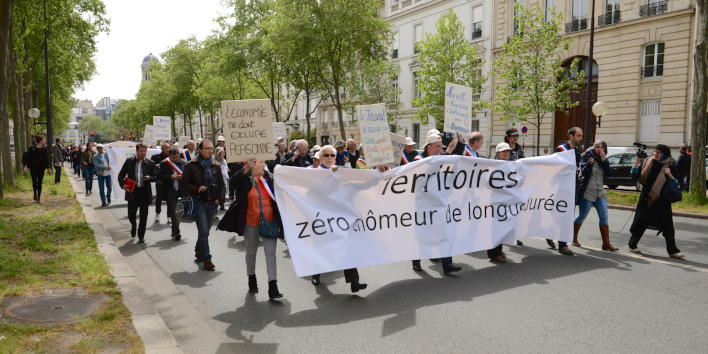Path To Employment

By the TZCLD team at ATD Fourth World
The “Zero Long-term Unemployment Zones” (TZCLD) project
Launched in 2011 by ATD Fourth World France, TZCLD has been under the stewardship of the organisation Territoires de Zéro Chômeur de Longue Durée since 2016. The project operates within France, where a substantial proportion of the population can obtain a job and maintain a dignified standard of living. However, there are still 2-3 million people in France who can only find temporary employment or employment that does not provide a decent standard of living.
Representing a wide range of social and cultural backgrounds, these individuals have skills and know-how. Yet today, they are marginalised by an economic system that considers those below a certain productivity threshold unemployable, simply because they are not ‘profitable’ enough.
What’s more, while there may be a shortage of jobs, there’s no shortage of work. Both observation and experience reveal numerous unaddressed societal needs, as well as useful trades that have fallen into disuse, solely because they lack full financial viability and thus are not lucrative enough for the conventional market.
These economic and political choices mean that individuals seeking employment are provided with assistance programs, which can perpetuate or exacerbate insecurity. A macroeconomic study (in French only) conducted by ATD Fourth World in 2015, and updated in 2017, estimates the annual cost of exclusionary unemployment to be at a minimum of 16-19,000 euros per person.
In light of this, the TZCLD project aims to put into effect the ‘right to have a job’ as articulated in the preamble to the 1946 French Constitution. This can be done at no additional cost to public finances, by redirecting the cost of long-term unemployment to finance new jobs.
Goals of the TZCLD project
The TZCLD project is part of a collective of small zones of France that have made the political choice to opt for an economic system designed to be inclusive of all individuals. At the local level (towns, local council communities, neighbourhoods) the project aims to provide employment opportunities for individuals who have faced prolonged joblessness and are actively seeking employment. These opportunities entail indefinite term employment contracts, minimum wage salaries, flexible working hours, and are tailored to the individuals’ skill sets.
TZCLD revolves around creating and financing new jobs based on the demands of the population, rather than solely supporting access to existing employment opportunities, which is currently inadequate because of job scarcity.
Potential springboard
In TZCLD, employment serves both as a safety net and a potential springboard. It guarantees the opportunity to find a full-time, minimum-wage job, along with good working conditions.
By being active members of society, individuals are regarded more favourably by prospective employers and within their communities, rather than being labelled as ‘very far from any kind of employment’.
Thus, the community experiences increased economic vitality and social welfare, making this initiative both a monetary and a social investment.
Because of the requirements of the project, only motivated zones where all the economic and political players want to participate will opt for this complementary economic system.
Local project team
Operationally, the local TZCLD project team is in charge of:
- Mobilisation of the community and its stakeholders;
- Recruitment of individuals who have been persistently denied employment;
- Identification of relevant and non-competitive local activities (including residents, businesses, and institutions) that individuals who have been chronically unemployed and who meet the needs of various stakeholders in the area can perform;
- Creation of “EBEs” (French companies where employees are paid in part through their unemployment benefits) whose main objective is creating jobs to meet local needs. Funding for these ventures is partially sourced from the redistribution of costs and shortfalls caused by long-term unemployment, as well as from the profit generated by the sale of semi-profitable work.
In EBEs, the primary focus is on furnishing employment for individuals. They receive on-the-job training and remain open to recruitment by ‘conventional’ companies, as long as the offered positions provide conditions that enable them to live in dignity.
A local committee, comprising all relevant stakeholders, makes it possible to steer the experiment at the local level. The committee guarantees the activities carried out by the EBEs align with the competitive sector and do not disrupt it.
The ETCLD Association, a private funding body, has the authority to receive financial support equivalent to the cost of long-term unemployment. This funds new jobs which meet identified needs. The ETCLD signs agreements with the participating zones and with the EBEs responsible for creating these jobs.
TZCLD stages
To ensure sustainability, the project comprises three stages:
The first stage, from 2016 to 2021, entailed implementing the project in 10 volunteer zones and was governed by the first act of legislation for the experiment.
Following largely positive feedback, Parliament passed another law to advance the experiment. This legislation facilitated a second stage from 2021 to 2026, broadening the scope of the programme beyond the first 10 locations to at least 50.
A new legal framework will need to be established for the third stage. This framework will allow any willing local authority to pursue the elimination of long-term unemployment within its boundaries.
Key data points
As of September 1, 2023:
- 58 location were testing the TZCLD project
- 2,183 people were working in 64 EBEs.
The main challenges
- Reaching individuals furthest removed from employment, some of whom believe that they are incapable of working and who will not actively seek out the project;
- Ensuring that these individuals are properly integrated and implementing management practices that are inclusive and welcoming to facilitate integration and long-term job retention;
- Managing the ‘job-creation companies’ efficiently, while ensuring that the search for profit and productivity doesn’t run counter to the project’s objective, which is to employ all people under sustainable conditions;
Quality working conditions are essential to sustaining long-term employment retention, particularly as a significant proportion of these individuals have been rendered vulnerable by life circumstances and previous work experiences.

